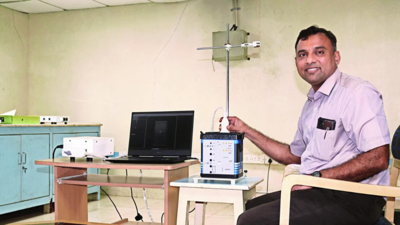
FOR QUICK DIAGNOSIS: Prof Arun K Thittai, department of applied mechanics and biomedical engineering, IIT Madras, with the pointof-care-ultrasound scanner CHENNAI: In sporting fields, team physios have been ascertaining injuries before deciding whether to let the player continue, but this can be tricky as the symptoms may not always be accurate indicators of the gravity of the injuries. Now, a portable scanner promises to give a clearer picture on the field and take a better informed decision. The POCUS (portable point-of-care-ultrasound) scanner can scan any body part to determine whether it is just an inflammation or a tear of the muscle - or more.
Researchers said the technology is AI-driven and different from the ones used in other commercial ultrasound scanners. "The thumb rule has been that the bigger the scanner, the better the quality of the image. This portable scanner changes that.

It's small and cost-effective, yet produces high-quality images," said Arun K Thittai of department of applied mechanics and biomedical engineering, IIT Madras. "AI helps ascertain the extent of the injury." The scanner helps coaches and physios customise training regime for different sportspersons based on their individual needs and strengths.
The research team headed by Thittai developed the scanner at the Centre of Excellence in Sports Science and Analytics (CESSA) on the IIT campus. "This aims to bring the latest development in ultrasound technology to sports medicine beyond the hospital setting. Inputs from POCUS assessment will be taken into the bigger AI platform for a holistic athlete management system .
It will help injury management as well," said the professor. A working POCUS prototype for musculoskeletal (MSK) imaging, developed at Biomedical Ultrasound Imaging Lab (BUSi), is ready. The team is planning to complete the product prototype development this year.
It will be tested and pilot data from the field will be studied in coordination with sports authorities. "This is going to have a big impact on sporting fields," said CESSA CEO Ramesh Kumar..














